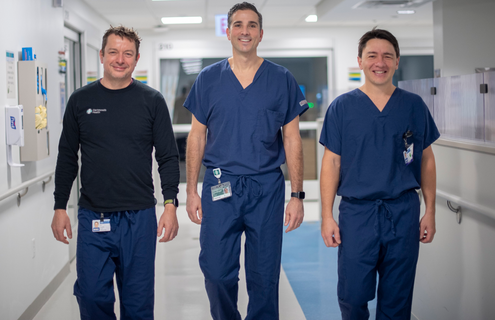
Orthopedic surgeons at two Dartmouth Health hospitals, Dartmouth Hitchcock Medical Center (DHMC) and Alice Peck Day Memorial Hospital (APD), are now offering knee, hip and shoulder joint replacement procedures that benefit from recently-acquired joint mapping and robotic-assisted surgical tools. This technology allows specialists to implant artificial joints with more precision and reproducibility.
“The orthopedic surgeons at Dartmouth Health perform among the highest number of hip and knee replacements in the region. The main advantage of adding robotics to our surgical toolkit is that it has the potential to elevate our patients’ clinical outcomes even further, by improving the precision of implant positioning and thereby optimizing post-surgical hip and knee function,” said Ivan M. Tomek, MD, a joint replacement surgeon based at APD who specializes in anterior approach hip replacement.
The three different technology platforms, which are each used for implants made by the same manufacturers, allow surgeons to achieve more precise readings on a patient’s joint alignment, soft tissues and anatomy to aid in planning. In the case of knee replacement surgery using robotic assistance, this can be done without the need to place a rod in the canal of the femur which is necessary with traditional instruments. This has the potential to limit the amount of bleeding during surgery and avoid increased surgical exposure. This technology allows surgeons to plan their bone resections, or the amount of bone being removed, down to the half millimeter to ensure better stability and balance.
“Robotic technology recognizes that every patient and every knee is different, and it enables us to more accurately measure and cut where it makes the most sense for each individual patient,” said Wayne E. Moschetti, MD, MS, an orthopedic surgeon based at DHMC and APD. “One of the goals is to release less soft tissue around the joint and use the technology to prepare the bone in a way that appropriately balances the artificial joint to the patients’ ligaments and tendons. This has the potential to reduce recovery times and makes the joint feel more ‘natural’ to the patient.”
One platform allows surgeons to see a simulation of the scanned joint moving in real time by observing the patient through augmented reality glasses which then allows for more accurate placement of the implant. Another system deploys advanced software to quickly gain precise measurements of implant position during a shortened X-ray imagining process in the operating room, limiting radiation exposure for clinicians and patients and improving implant position during hip replacement. A third system synchronizes the surgeon’s tools with mapping software to guide the surgeon with feedback, ensuring precise resections are made during the operation to accurately match the surgical plan.
So far, surgeons Tomek, Moschetti, Timothy J. Lin, MD, MS, Alexander R. Orem, MD, MS, Peter L. Schilling, MD, MS, and Michael B. Sparks, MD, are trained in using one or more of the new platforms, and they will be performing surgeries at both DHMC and APD.
Combined, these surgeons perform more than 2,200 primary joint replacements and revisions over the course of a year, making them some of the most experienced joint surgeons in New Hampshire, Vermont and Maine.
Visit the Dartmouth Health website to learn more.
About Alice Peck Day Memorial Hospital (APD)
Known for highly personalized and high-quality care, APD is the community hospital of the Upper Valley of Vermont and New Hampshire. Founded in 1932 and a member of Dartmouth Health since 2016, APD’s areas of clinical excellence include surgical services, primary care, geriatric care, sleep health, orthopaedics, and emergency services. The APD campus is also home to a senior living community with assisted and independent living facilities. Follow us on Facebook, Instagram, LinkedIn, Twitter, and YouTube.